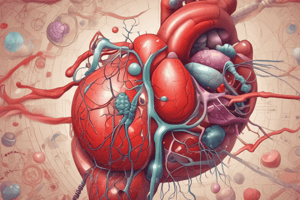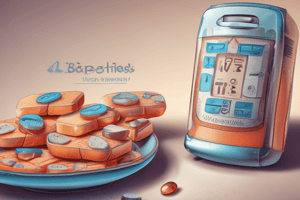Podcast
Questions and Answers
What is the primary mechanism of action of Biguanides, such as Metformin?
What is the primary mechanism of action of Biguanides, such as Metformin?
- Increases insulin secretion from the pancreas
- Increases glucagon secretion from the pancreas
- Decreases insulin sensitivity
- Decreases hepatic glucose production, decreases intestinal absorption of glucose, and improves insulin sensitivity (correct)
What percentage of diabetes mellitus cases are estimated to be Type 1 Diabetes?
What percentage of diabetes mellitus cases are estimated to be Type 1 Diabetes?
- 10% (correct)
- 90%
- 5%
- 20%
What is a common side effect of Metformin?
What is a common side effect of Metformin?
- Nausea (correct)
- Muscle weakness
- Headache
- Hypoglycemia
What is the expected effect of Metformin on HbA1C levels?
What is the expected effect of Metformin on HbA1C levels?
What is a contraindication for the use of Metformin?
What is a contraindication for the use of Metformin?
What is a clinical pearl to keep in mind when using Metformin?
What is a clinical pearl to keep in mind when using Metformin?
Flashcards are hidden until you start studying
Study Notes
Diabetes Mellitus
- Diabetes Mellitus is a disease in which insulin, a hormone that secretes glucose for energy, is insufficient or ineffective.
DM1 vs DM2
- DM1 is often seen in children, also known as "Kitsis".
- DM2 accounts for 90% of all diabetes cases.
Oral Treatment Options
- Biguanides: a class of medications used to treat diabetes.
- Medication: Metformin.
- Mechanism of Action (MOA): decreases hepatic glucose production, decreases intestinal absorption of glucose, and improves insulin sensitivity.
- Effects:
- Weight Neutral.
- Lowers HbA1C by 1-2%.
- Side Effects:
- Diarrhea.
- Nausea.
- Flatulence.
- Vitamin B12 Deficiency, which can lead to anemia if left untreated.
- Clinical Pearls:
- Contraindicated in severe renal dysfunction (eGFR < 30 mL/min).
Studying That Suits You
Use AI to generate personalized quizzes and flashcards to suit your learning preferences.




